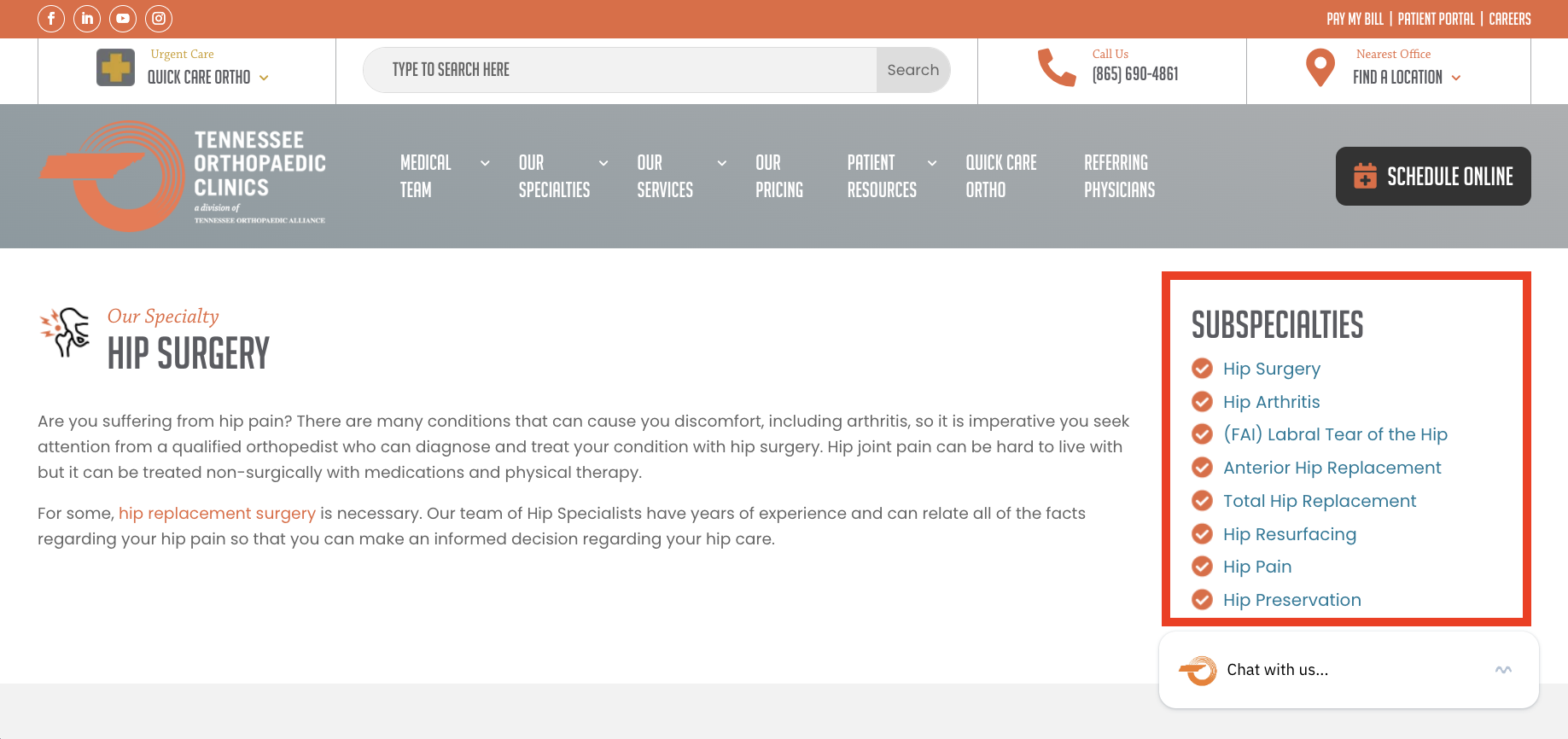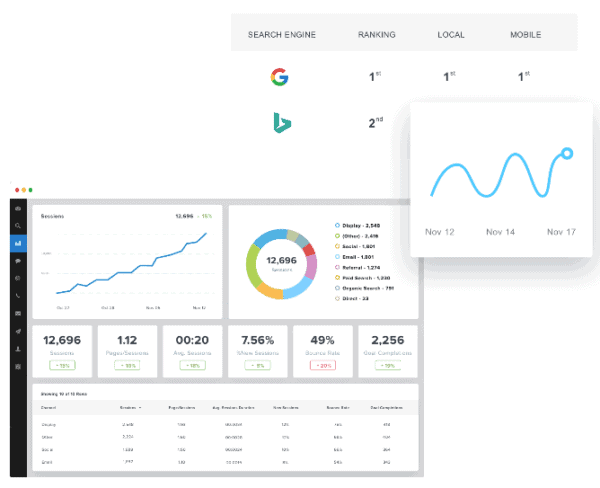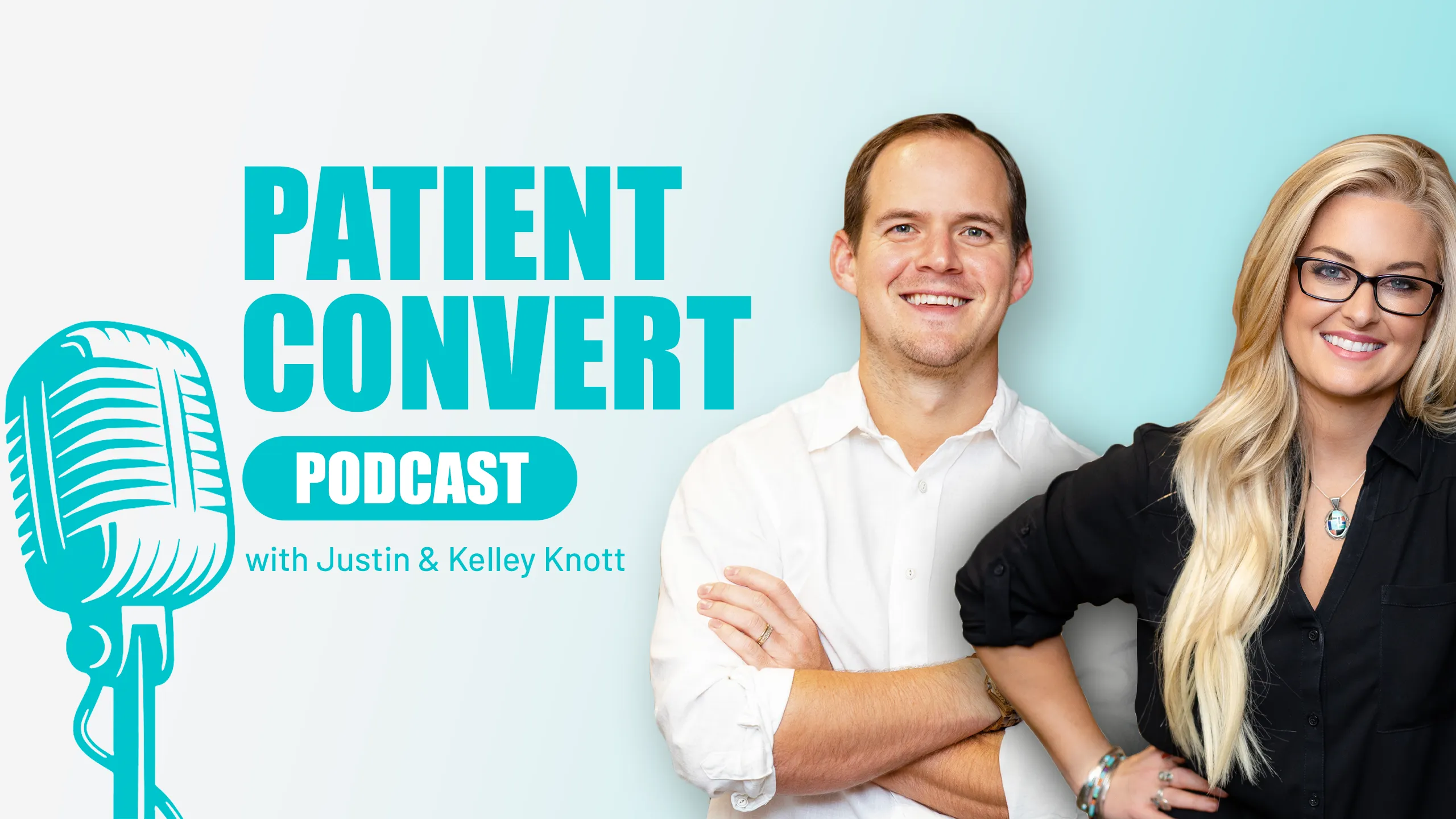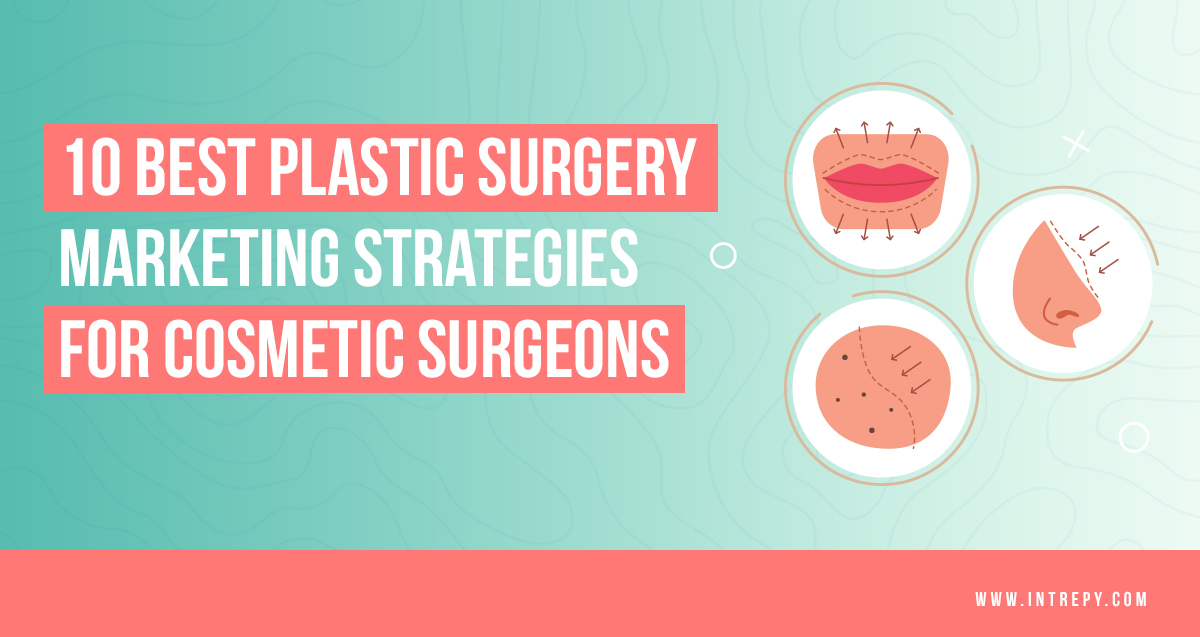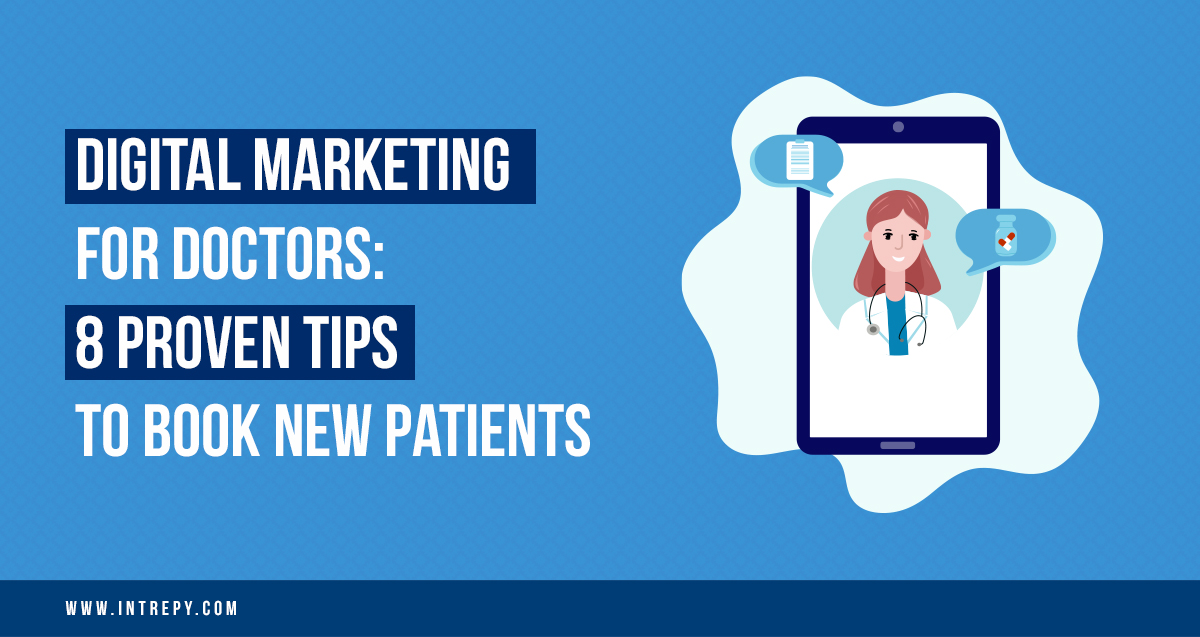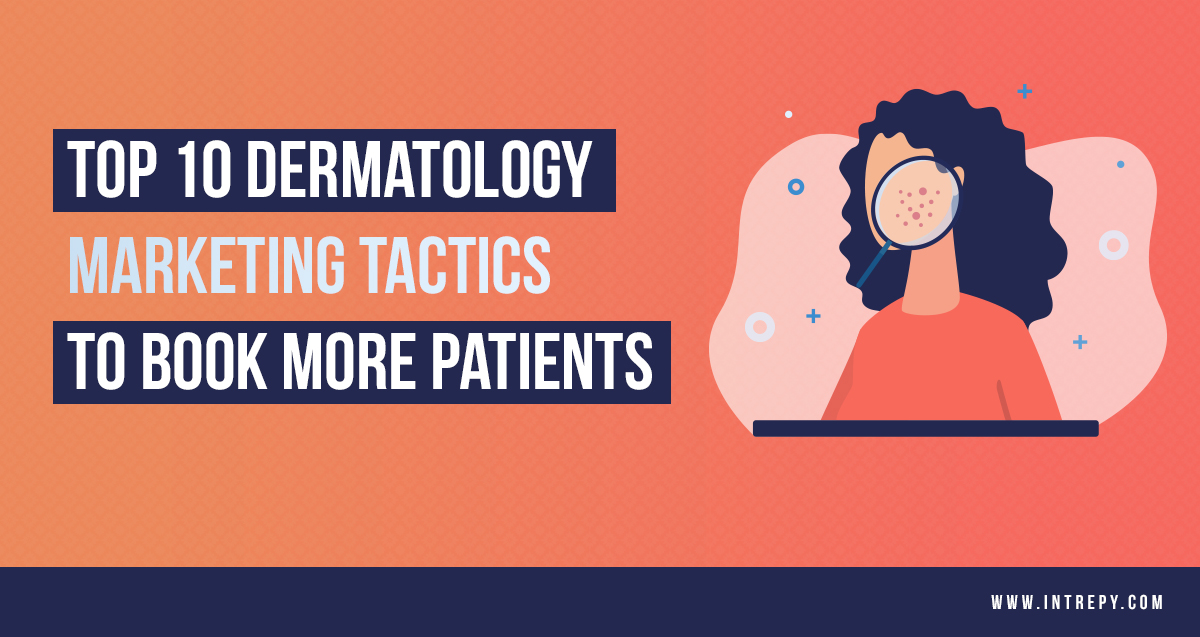The Top Healthcare Marketing Strategy and Tips to Grow Your Organization
Healthcare marketing has evolved and grown to be a sophisticated process of finding creative ways to engage with patients where they are on the patient care continuum.
Patients are more than ever interested in taking back their healthcare journey and educating themselves on what you do and how you do it.
That is why it is critical to develop an effective healthcare marketing strategy to reach and educate new and existing patients.
What is Healthcare Marketing?
Healthcare marketing refers to the strategic and targeted efforts undertaken by healthcare organizations, providers, and professionals to promote their services, build brand awareness, and engage with patients and the wider healthcare community.
It involves the use of various marketing channels and tactics to effectively communicate the value and benefits of healthcare services, treatments, or medical products.
Healthcare marketing aims to reach and attract the right audience, whether it’s patients seeking medical care, referring physicians, or stakeholders in the healthcare industry.
By utilizing market research, data analytics, digital platforms, and traditional marketing methods, healthcare organizations can enhance their visibility, establish trust, and ultimately drive patient acquisition and loyalty.
Effective health care marketing campaigns often focus on providing educational content, building relationships, and addressing the unique needs and concerns of patients to improve overall healthcare outcomes.
Why is Health care Marketing important?
The importance of marketing in healthcare is to develop and execute marketing strategies geared toward engaging and educating patients on their healthcare journey through SEO, digital patient advertising, website, content marketing, and more.
The most effective marketing in healthcare is patient-centric, meaning it focuses on who the patient is, what information they care about, and building a know, like, and trust relationship.
The healthcare industry is always changing, and patient education and information are fastly becoming the forefront of focus.
The healthcare world is competitive, and as local competition grows and large hospital systems come into the mix, the more difficult it can be to stand out and promote your medical services.
Healthcare marketing allows you to increase your visibility from your competitors on local search engines and social media platforms.
Another reason why healthcare marketing is important is that an effective healthcare marketing strategy can provide the ability to reach potential patients and position you as a thought leader in your specialty.
Benefits of Healthcare Marketing…
1. Increase your patient acquisition
Marketing for healthcare enables organizations to expand their reach and attract new patients.
By utilizing targeted health care marketing campaigns, healthcare providers can raise awareness about their services and specialties, showcasing their expertise and unique value propositions.
This increased visibility can lead to a higher volume of patient inquiries and conversions, ultimately driving patient acquisition and revenue growth.
2. Enhance Brand Awareness through healthcare marketing strategies
Building a strong brand presence is crucial in healthcare.
A well-executed marketing strategy helps establish brand recognition and credibility among patients, referring physicians, and the broader healthcare community.
Through consistent messaging, engaging content, and strategic branding efforts, healthcare organizations can differentiate themselves from competitors and foster trust among their target audience.
3. Improve Patient Engagement and Retention
Effective healthcare marketing goes beyond acquiring new patients; it focuses on cultivating long-term relationships.
By utilizing various marketing channels, such as social media, email campaigns, and educational content, healthcare organizations can engage with patients on an ongoing basis.
Regular communication and personalized interactions can enhance patient loyalty, encourage repeat visits, and generate positive word-of-mouth referrals.
4. Targeted & Data Driven Approach to marketing in healthcare
Healthcare marketing allows organizations to leverage data and analytics to identify and target specific patient demographics.
By understanding patient preferences, behaviors, and needs, healthcare providers can tailor their marketing efforts to resonate with the right audience.
This targeted approach not only maximizes the impact of marketing campaigns but also helps allocate resources efficiently, ensuring a higher return on investment.
5. Adaption of Digital Transformation post-pandemic
The rapid growth of digital platforms has revolutionized the way patients seek and access healthcare information.
Healthcare marketing embraces this digital transformation by leveraging online channels, medical SEO, programmatic advertising, and healthcare content marketing.
By meeting patients where they are online, healthcare organizations can stay ahead of the curve and effectively connect with the digital-savvy patients of today.
How to Create a Healthcare Marketing Strategy
Healthcare marketing strategy involves leveraging a collective group of marketing channels both digitally and offline designed to specifically target new and existing patients for practices and hospital systems to improve patient care and generate growth and revenue.
In the last five years, the amount of healthcare marketing professionals and agencies specializing in marketing for medical practices has grown substantially.
Patients have become more sophisticated in how they utilize and integrate the internet into their daily lives.
As a result of constant advertising, patients have become somewhat “tone-deaf” to the messages they receive.
They also want to feel that the marketing and advertising they do consume are extremely patient-centric.
Fortunately, more prospective patients are turning to the internet via search engines and social platforms to take their health into their own hands.
They are in search of finding information, practices, and hospitals to aid in their pursuit of optimal health.
80% of potential patients look online for health information about a specific medical problem or disease.
So, what healthcare marketing strategies for medical practices are most effective?
Patients are active and engaged more than ever online, so that is why it is critical to put healthcare marketing strategies in place for 2020.
Where do you start putting together a medical marketing plan?
This will not be surface-level theory that says “create a Facebook profile,” but we will look at each component of a healthcare marketing strategy:
- What tactics to use
- Why they are effective
- Real-life case studies and examples
- Instructions to get you started
Top Healthcare Marketing Strategies to Reach Patients
Now that we more closely understand the importance and benefits of healthcare marketing services, it is time to take a look at the most effective tips that you should be leveraging in your practice to reach and convert new patients.
Marketing in healthcare can seem overwhelming as to what to do and where to get started, which is why we laid out these healthcare marketing strategies and case studies as well.
These are tested and proven healthcare marketing strategies that we leverage with our clients day in and day out.
1. Build a Website focused on engaging and educating patients
Creating a compelling medical website design is a crucial step in engaging patients and building trust in the digital age.
Start by designing an intuitive and user-friendly interface that allows visitors to easily navigate and find the information they need.
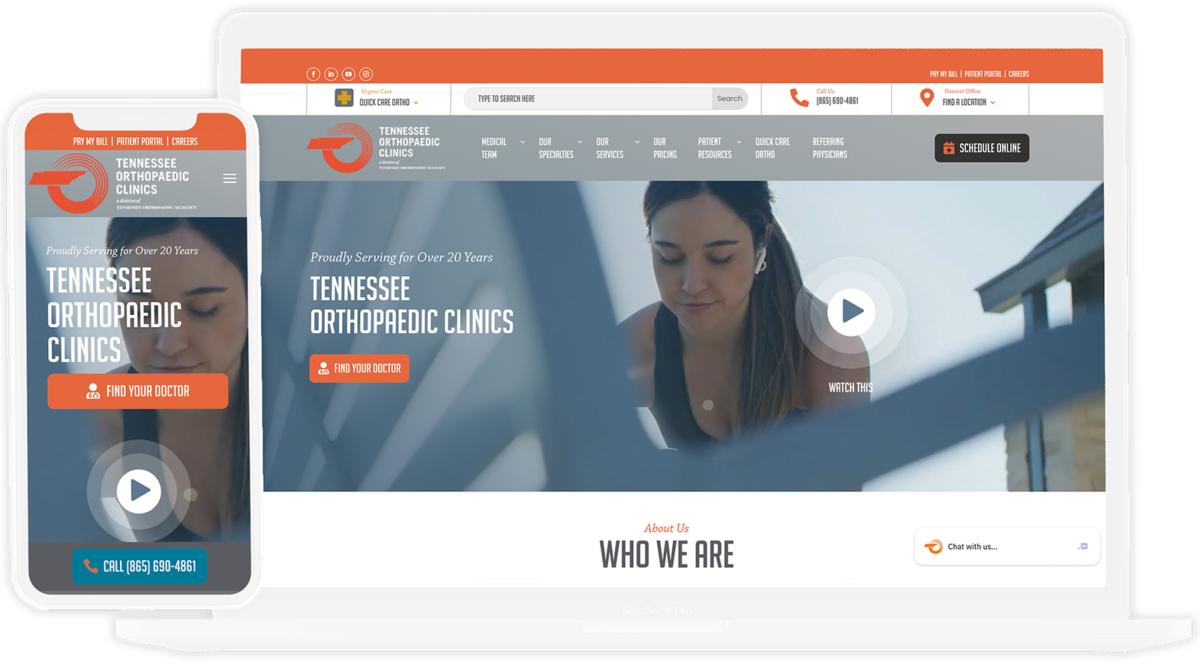
Incorporate interactive elements such as appointment booking, contact forms, and live chat functionalities to encourage patient engagement and facilitate communication.
Ensure your website is mobile-friendly and optimized for search engines to reach a wider audience.
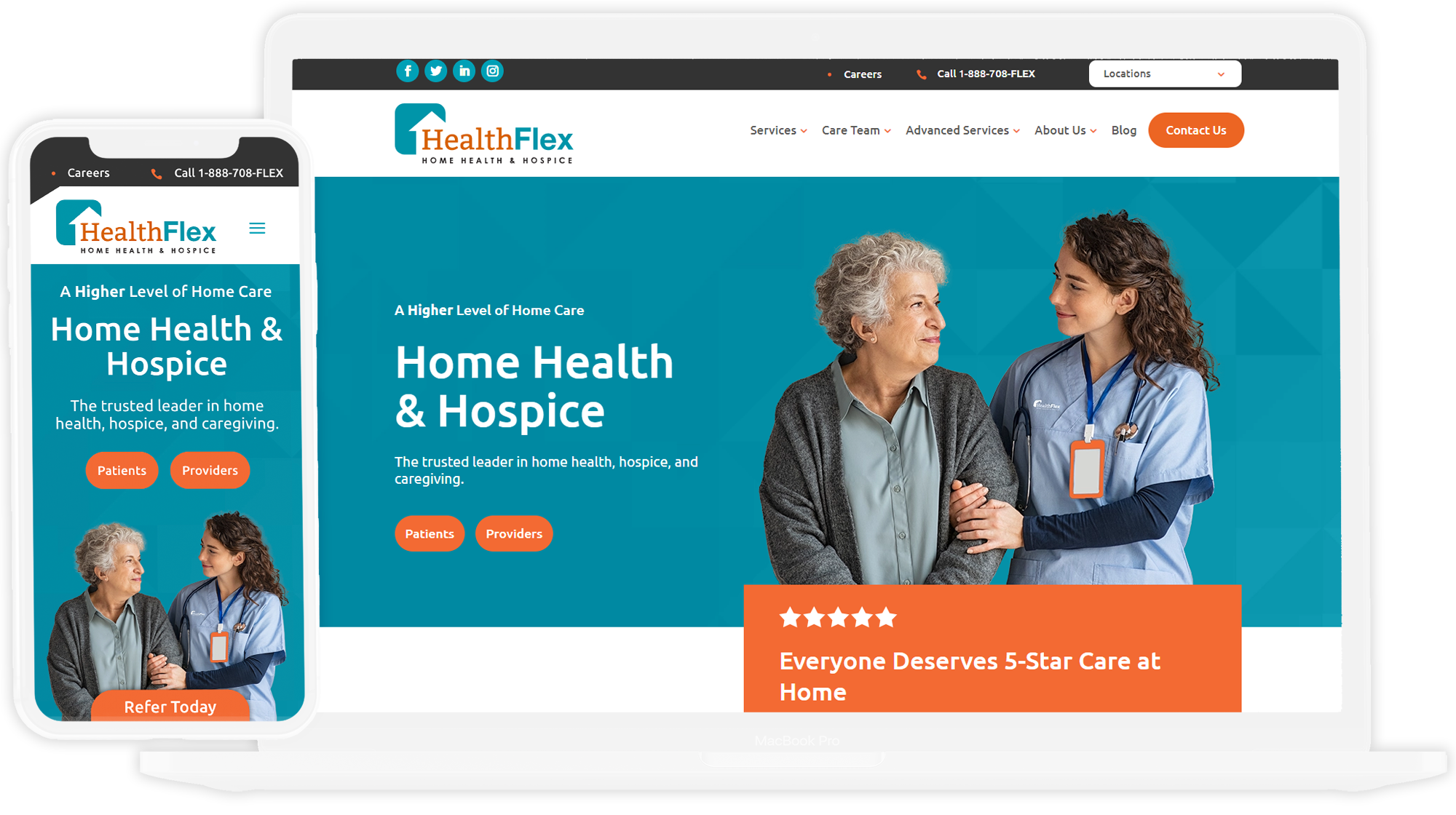
Lastly, regularly update your website with fresh content and stay responsive to patient feedback to maintain a dynamic and patient-centric online presence.
2. Medical SEO for your website is an essential healthcare marketing strategy now
Healthcare marketing strategies play a vital role in the success of medical practices, and focusing on SEO is a powerful approach to attract patients searching for specific treatments and conditions.
To optimize orthopedic marketing efforts, it’s crucial to develop content-rich pages that target treatments, conditions, and surgeries.
Creating a comprehensive content library dedicated to each topic strengthens SEO growth and increases the chances of ranking higher in local Google searches, ultimately generating new patient leads.
Rather than solely focusing on broad categories like hip surgery or knee surgery, it’s essential to delve deeper and create individual sub-pages for specific treatments and conditions.
Here is an example of how we did just that on a large orthopedic practice website to not only strengthen the main treatment page but expand their content library of Hip specific treatments and conditions.
After implementing this process over nearly 2 years and adding 30,000+ words of treatment content their website is up over 100% in organic search traffic!
By implementing this marketing for healthcare strategy, your medical practice can gain an edge over local competitors and experience increased patient traffic for targeted search terms, resulting in enhanced patient engagement and successful orthopedic procedures.
3. Reputation matters to patients so grow it!
Reputation management is a significant healthcare marketing trend, especially concerning the growth of Google Business Profiles (GBPs).
With Google’s emphasis on local medical SEO and user-generated content (UGC), patient feedback plays a crucial role in the accuracy and relevance of GBPs.
Today, patients rely on online reviews and ratings to select healthcare providers, a shift that has been accelerated by the consumerization of healthcare and the COVID-19 pandemic.
Patients seek convenience and quality of care, often prioritizing these factors over network affiliations.
As a result, healthcare organizations must adapt their marketing strategies to proactively gather new reviews on both location and provider GBPs.
Automating this process is highly recommended, as it streamlines the collection of feedback.
Additionally, Google’s algorithm analyzes the keyword content of reviews, extracting relevant keywords that can influence search rankings.
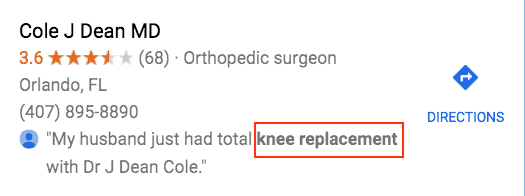
4. Programmatic Display Ads are a new and upcoming healthcare advertising focus
Programmatic display advertising has revolutionized the way healthcare organizations reach their target audience, offering precise targeting capabilities and enhanced engagement opportunities.
This powerful healthcare advertising strategy utilizes automation and real-time bidding to deliver targeted ads across various websites, devices, and digital platforms.
Here’s why the programmatic display is a game-changer in healthcare advertising:
- Precision Patient Targeting: With programmatic display, healthcare marketers can leverage advanced targeting options to reach specific patient demographics, interests, and behaviors.
- Dynamic Ad Personalization: Programmatic display enables dynamic ad personalization, where ad content can be tailored based on individual user characteristics or real-time data. This level of personalization helps create more meaningful and engaging ad experiences for patients.
- Real-Time Optimization: Programmatic display advertising allows for real-time optimization of campaigns.
- Enhanced Reach and Scale: Programmatic display offers access to an extensive network of websites, mobile apps, and digital platforms, providing healthcare marketers with a wide reach and scale.
- Cost-Efficiency: Programmatic display advertising can offer cost-efficiency compared to traditional media buying methods. By leveraging real-time bidding and automated campaign management, marketers can optimize budgets and allocate ad spend effectively. .
5. Google Ads is a top healthcare advertising strategy
When it comes to medical marketing strategies, Google Ads stands out as my top choice.
The platform offers exceptional value due to the inherent search intent and high-quality leads it generates. Let’s explore why Google Ads is crucial for healthcare advertising success.
One of the key factors that sets Google Ads apart is the patient search intent.
Unlike other healthcare advertising strategies, search ads on Google have a natural “appointment” intent.
This means that when patients search for specific medical services or specialists, they are actively seeking to book an appointment.
As a result, these leads tend to require fewer touchpoints and are more qualified, increasing the likelihood of conversions.
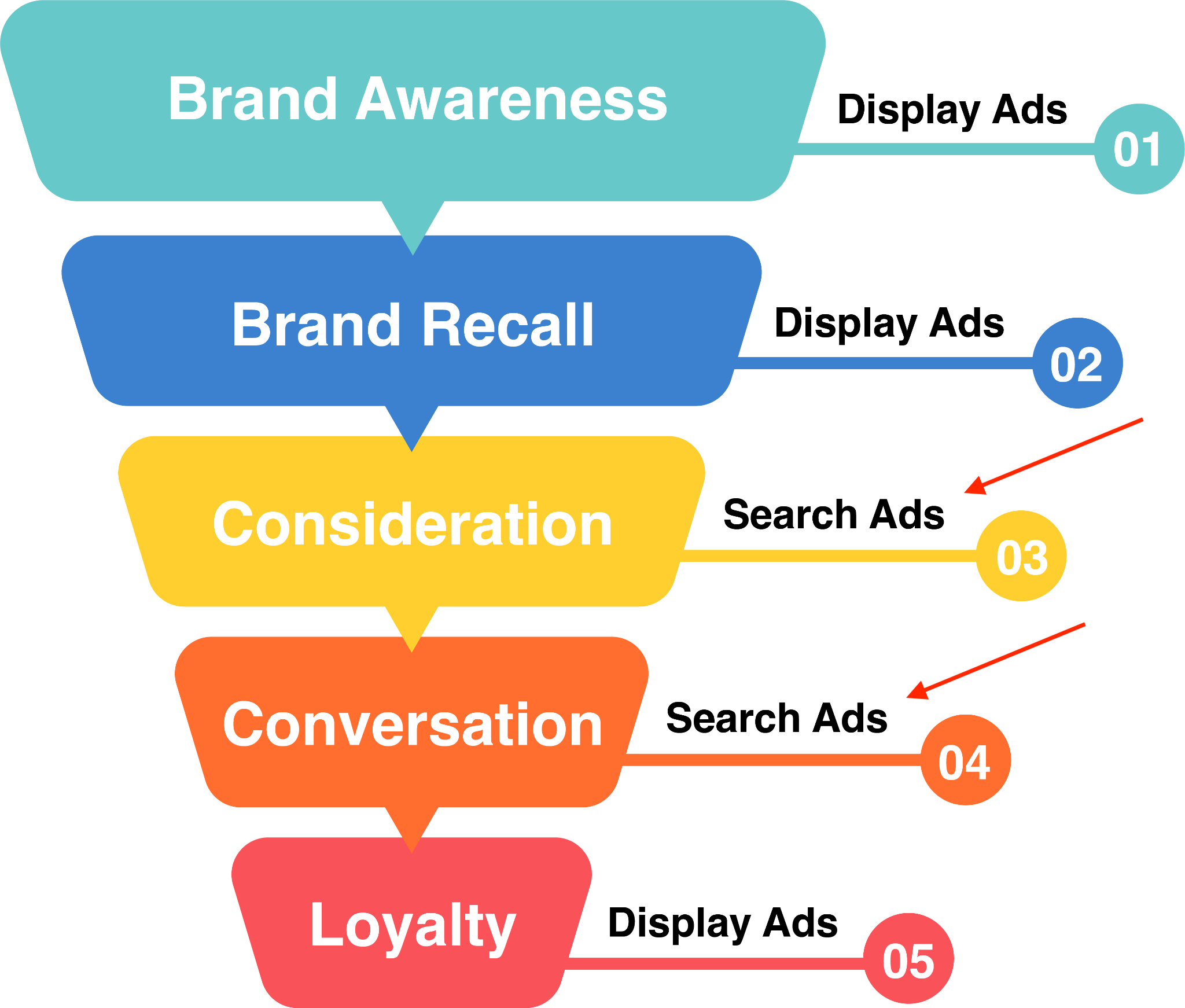
With push marketing, such as advertising on social media, you are presenting ads to potential patients who may not necessarily need your medical practice’s services at that moment.
On the other hand, when a person searches on Google for a specific term like “frozen shoulder specialist near me,” they are actively looking for a solution and are more likely to book an appointment.
This targeted intent allows healthcare marketers to connect with patients who are ready to take action.
For instance, we developed a Google Ad campaign targeting specific keywords related to ‘Orthopedic urgent care near me’.
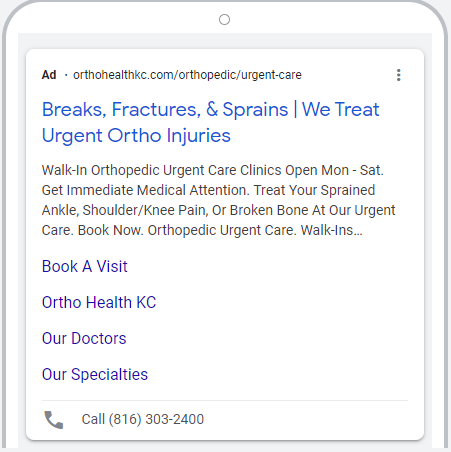
This approach generated a steady stream of high-quality appointment bookings for the client.
Google Ads proved to be an effective tool for driving new patient acquisitions and revenue, especially for high-margin cash procedures.
6. A Patient Email Address is Still Extremely Valuable
Email is still not only a viable but powerful marketing in healthcare tool that you should be leveraging.
Whether it’s new patient funnels, remarketing to existing patients, or disseminating critical information during times like COVID, email is a vital line of communication between you and your patients.
Investing resources into developing a healthy email marketing program will yield a steady stream of new and returning patients through your doors (physical or virtual).
A few great tips for growing your list include:
- Hosting a webinar
- Paid advertising funnels like quizzes and assessments
- Downloads and ebooks
- Exclusive subscriber content
7. Backlink Building is an important part of SEO
Backlink building is a crucial healthcare marketing strategy that plays a significant role in improving online visibility, authority, and search engine rankings.
Backlinks are links from external websites that point back to your healthcare website.
They serve as a vote of confidence and credibility, indicating to search engines that your website is trusted and reputable.
When reputable websites link to your healthcare content, it not only drives referral traffic but also signals to search engines that your content is valuable and relevant.
This can result in higher search engine rankings, increased organic traffic, and enhanced brand recognition.
Additionally, backlinks from authoritative healthcare websites and industry influencers can establish your healthcare organization as a thought leader in the field, fostering trust and attracting potential patients.
We implement backlink building for almost all of our SEO clients at some point in their content growth process.
Local medical practices typically can do this as a phase 2 or 3 approach after they have built out their content library.
National SEO clients it is critical to develop and focus on a backlink building campaign to increase domain authority as you are competing with a much large pool of websites and search results
By implementing a strategic backlink-building approach, healthcare marketers can boost their online presence, strengthen their reputation, and ultimately drive patient acquisition and practice growth.
8. Video is a key healthcare marketing strategy for doctors
In today’s digital landscape, where attention spans are fleeting and competition is fierce, video marketing has emerged as a powerful tool for doctors and healthcare marketing to connect with patients on a deeper level.
By harnessing the power of videos, doctors can humanize their practice, educate patients, and build trust in ways that traditional marketing methods simply can’t match.
One of the key advantages of video marketing for doctors lies in its ability to deliver information in a concise and accessible format.
Medical concepts and procedures can often be intimidating and confusing for patients, making it challenging to effectively communicate important details.
Videos allow doctors to break down complex medical jargon into easily digestible content, ensuring patients understand their conditions, treatment options, and preventive measures.
Furthermore, video marketing enables doctors to showcase their expertise and establish credibility within their field.
By sharing educational videos, doctors can position themselves as trusted authorities, offering valuable insights and advice to patients and the wider community.
When patients see doctors confidently explaining medical concepts or addressing common health concerns, it instills a sense of confidence and fosters a stronger patient-doctor relationship.
We believe in this healthcare marketing strategy so much at the agency that we created our own Saas healthcare video marketing tool, CaptureMD.
9. Analytics and Tracking are Keys to Healthcare Marketing Strategy
Now that we have looked at several of the best healthcare marketing strategies, it all comes down to one thing…
How do you know what is working and where the opportunities for improvement lie?
By keeping a close eye on your marketing analytics and making sure you are tracking campaigns accurately.
The best healthcare marketing is rooted in data.
To improve, you have to know what is working and be able to attribute success and failure accordingly to be continually improving.
This starts by investing in analytics.
You can start with the essentials like Google Analytics and Google Search Console, to name a few.
When you a ready to see if all in one place, then marketing analytics dashboards are right for you.
Here at Intrepy, we put the utmost importance on data visualization, and it’s why all of our clients get access to analytics dashboards at all times.
Best Healthcare Marketing Strategies – Wrapping Up
Marketing for healthcare is an ever-changing world but has endless possibilities for healthcare professionals to reach the audience they need, grow their patient base, educate patients, feature physicians, and scale their practice.
When beginning your healthcare marketing strategy, choose a partner that understands the space, and only focuses on marketing in healthcare.
A healthcare marketing agency understands the patient experience and industry and can use tested and proven methods to get you where you want to be!
If you are looking to grow or talk to an expert on the subject, book a free video practice marketing session here!
